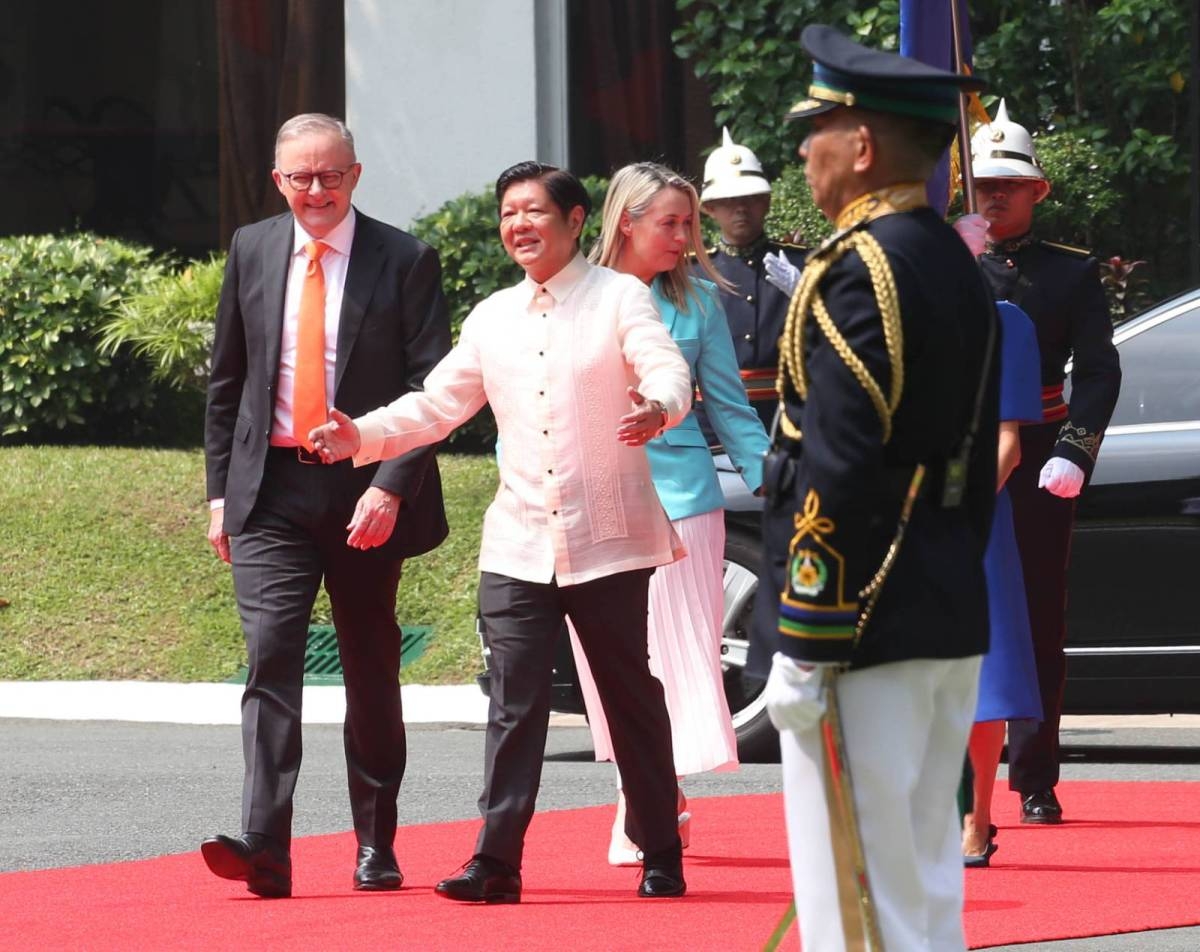THE Philippines and Australia have entered into a landmark security and economic alliance that firms up their cooperation in bringing about “an open, stable and prosperous Indo-Pacific region.”
The Joint Declaration on Strategic Partnership was signed last week by President Ferdinand Marcos Jr. and Australian Prime Minister Anthony Albanese.
It is one of the most comprehensive cooperation pacts the Philippines has sealed with its allies, considering its scope, which covers areas ranging from defense and security to climate change and education.
President Marcos hailed the declaration as an indication of “our mutual commitment to deepening collaboration across a spectrum of areas that are vital to both our countries' growth and prosperity.”


Prime Minister Albanese extolled the declaration as “an important symbol of the strength of our relationship and our shared commitment to do more together.”
The security aspect of the agreement factors in the geopolitical turbulence in the region stirred by China's increasingly aggressive expansionist actions, particularly in the South China Sea.
In a joint statement, Marcos and Albanese reaffirmed their countries' commitment “that all disputes should be resolved peacefully, without the threat or use of force or coercion, in accordance with international law, particularly the 1962 United Nations Convention on the Law of the Sea (Unclos), and that the South China Sea arbitration award of 12 July 2016 is final and legally binding on both parties, and call on both parties to abide by the award.”
China has refused to recognize the 2016 arbitral ruling after the Philippines successfully challenged Beijing's claim to practically the entire South China Sea.
The declaration brings cooperation one step further, announcing that the two countries plan “bilateral joint patrols in the South China Sea and in areas of mutual interest to support regional peace and stability.”
They also reiterated their “commitment to Asean centrality and recognize the importance of an inclusive Asean-led architecture for regional peace, stability and prosperity…”
The signing of the agreement could not have come at a more opportune time. Just hours earlier, boats delivering supplies to Philippine troops on Ayungin Shoal eluded a blockade of Chinese coast guard and militia vessels to complete their mission.
China has been trying to cut off the supply line to the Ayungin outpost, a remote bastion of Philippine sovereignty in the West Philippine Sea, by bullying resupply boats.
Bilateral agreements have enabled the Philippines and Australia to maintain security and defense ties. The 2007 Philippine-Australia Status of Forces Agreement (SOFA), for one, provides legal guarantees to Australian forces conducting joint counter-terrorism exercises in the Philippines.
The SOFA has striking similarities to the United States' Visiting Forces Agreement (VFA), which came into effect in 1999. The Australian version, however, was never fully implemented.
The SOFA, in fact, almost faded into history after President Rodrigo Duterte turned his back on traditional allies like Washington and Canberra and looked eastward toward Beijing.
Last year, with a new president at the helm, Canberra began to re-energize its security alliance with the Philippines. The strategic partnership is evidence of that renewed impetus.
The economic aspect of the partnership is equally impressive. The two countries pledged to “explore opportunities to broaden mutual economic cooperation, including developing resilient supply chains, supporting the climate and the clean energy transition.”
They vowed to work toward enhancing free trade agreements between them, including the Regional Comprehensive Economic Partnership (RCEP) and the Asia-Pacific Economic Cooperation (APEC).
Australia was the Philippines' 14th-largest trading partner in 2022 and its 11th-biggest source1 of official development assistance (ODA), amounting to $180 million.
The new partnership deal aims to ramp up those figures.
Bearing fruit
There are signs that the partnership is beginning to bear fruit, literally. The Department of Agriculture has announced that after 10 years, the Philippines has resumed shipping carabao mangoes to Australia. Australian authorities had barred the fruit, saying it was below international standards.
The initial 1,500 kilograms of mangoes from Davao were shipped to Perth and Sydney last week.
Taken as a whole, the strategic partnership with Australia presents the ideal template for building a framework for closer cooperation with the Philippines' other allies.
*****
Credit belongs to : www.manilatimes.net
 MaharlikaNews | Canada Leading Online Filipino Newspaper Portal The No. 1 most engaged information website for Filipino – Canadian in Canada. MaharlikaNews.com received almost a quarter a million visitors in 2020.
MaharlikaNews | Canada Leading Online Filipino Newspaper Portal The No. 1 most engaged information website for Filipino – Canadian in Canada. MaharlikaNews.com received almost a quarter a million visitors in 2020.
